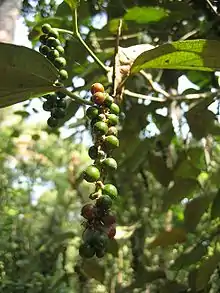piper
See also: Piper
English

piper (playing bagpipes)
Etymology 1
From Middle English piper, pipere; equivalent to pipe + -er.
Noun
piper (plural pipers)
Derived terms
Aromanian
Alternative forms
- piperu, chiper
Etymology
From Greek πιπέρι (pipéri), from Ancient Greek πέπερι (péperi).
Derived terms
- mpipiredz
Latin

piper (pepper)
Etymology
From Ancient Greek πέπερι (péperi, “pepper”), via Middle Persian from an Indo-Aryan source; compare Sanskrit पिप्पलि (pippali, “long pepper”).
Pronunciation
- (Classical) IPA(key): /ˈpi.per/, [ˈpɪpɛr]
Inflection
Third declension neuter.
| Case | Singular | Plural |
|---|---|---|
| Nominative | piper | pipera |
| Genitive | piperis | piperum |
| Dative | piperī | piperibus |
| Accusative | piper | pipera |
| Ablative | pipere | piperibus |
| Vocative | piper | pipera |
Related terms
- piperītis
Descendants
References
- piper in Charlton T. Lewis and Charles Short (1879) A Latin Dictionary, Oxford: Clarendon Press
- piper in Charlton T. Lewis (1891) An Elementary Latin Dictionary, New York: Harper & Brothers
- piper in Gaffiot, Félix (1934) Dictionnaire Illustré Latin-Français, Hachette
- piper in Harry Thurston Peck, editor (1898) Harper's Dictionary of Classical Antiquities, New York: Harper & Brothers
- piper in William Smith et al., editor (1890) A Dictionary of Greek and Roman Antiquities, London: William Wayte. G. E. Marindin
Middle English
Etymology 1
From Old English pipor.
Etymology 2
From Old English pīpere; equivalent to pipe + -er; compare Old Norse pípari and Old High German pfīfari.
Pronunciation
- IPA(key): /ˈpiːpər(ə)/
References
- “pīper(e (n.)” in MED Online, Ann Arbor, Mich.: University of Michigan, 2007, retrieved 2018-12-07.
Norman
Norwegian Bokmål
Norwegian Nynorsk
Old English
Romanian

piper
Etymology
From Slavic piperĭ, Greek πιπέρι (pipéri), from Ancient Greek πέπερι (péperi).
Swedish
West Frisian
Further reading
- “piper”, in Wurdboek fan de Fryske taal (in Dutch), 2011
This article is issued from Wiktionary. The text is licensed under Creative Commons - Attribution - Sharealike. Additional terms may apply for the media files.